
Back 20ste eeu Afrikaans 20. Jahrhundert ALS 20ኛው ምዕተ ዓመት Amharic Sieglo XX AN 20e gēarhundred ANG القرن 20 Arabic لقرن 20 ARY القرن العشرين ARZ Sieglu XX AST XX гӀасру AV

| Millennium |
|---|
| 2nd millennium |
| Centuries |
| Timelines |
| State leaders |
| Decades |
| Categories: |
|
Births – Deaths Establishments – Disestablishments |
The 20th century began on 1 January 1901 (MCMI), and ended on 31 December 2000 (MM).[1][2] It was the 10th and last century of the 2nd millennium and was marked by new models of scientific understanding, unprecedented scopes of warfare, new modes of communication that would operate at nearly instant speeds, and new forms of art and entertainment. Population growth was also unprecedented,[3] as the century started with around 1.6 billion people, and ended with around 6.2 billion.[4]
The 20th century was dominated by significant geopolitical events that reshaped the political and social structure of the globe: World War I, the Spanish flu pandemic, World War II and the Cold War. Unprecedented advances in science and technology defined the modern era, including the advent of nuclear weapons and nuclear power, space exploration, the shift from analog to digital computing and the continuing advancement of transportation, including powered flight and the automobile. The Earth's sixth mass extinction event, the Holocene extinction, continued, and human conservation efforts increased.
Major themes of the century include decolonization, nationalism, globalization and new forms of intergovernmental organizations. Democracy spread, and women earned the right to vote in many countries in the world. Cultural homogenization began through developments in emerging transportation and information and communications technology, with popular music and other influences of Western culture, international corporations, and what was arguably a truly global economy by the end of the 20th century. Poverty was reduced and the century saw rising standards of living, world population growth, awareness of environmental degradation and ecological extinction.[5][6] Automobiles, airplanes, and home appliances became common, and video and audio recording saw mass adoption. These developments were made possible by the exploitation of fossil fuel resources, which offered energy in an easily portable form, but also caused concern about pollution and long-term impact on the environment. Humans started to explore space, taking their first footsteps on the Moon. Great advances in electricity generation and telecommunications allowed for near-instantaneous worldwide communication, ultimately leading to the Internet. Meanwhile, advances in medical technology resulted in the near-eradication and eradication of many infectious diseases, as well as opening the avenue of biological genetic engineering. Scientific discoveries, such as the theory of relativity and quantum physics, profoundly changed the foundational models of physical science, forcing scientists to realize that the universe was more complex than previously believed, and dashing the hopes (or fears) at the end of the 19th century that the last few details of scientific knowledge were about to be filled in.
- ^ Bikos, Konstantin. "When Did the 21st Century Start?". Time and Date. Retrieved 20 Jan 2024.
- ^ "The 21st Century and the 3rd Millennium When Did They Begin?". United States Naval Observatory. Archived from the original on 2019-10-02. Retrieved 2013-06-07.
- ^ Lutz, Wolfgang; Sanderson, Warren C.; Scherbov, Sergei (2004), Lutz, Wolfgang; Scherbov, Sergei (eds.), "The End of World Population Growth", The End of World Population Growth in the 21st Century, Routledge, doi:10.4324/9781315870571, ISBN 978-1-315-87057-1, retrieved 2024-01-15
- ^ "World Population by Year - Worldometer". www.worldometers.info. Retrieved 2024-01-15.
- ^ Wilson, E.O., The Future of Life (2002) (ISBN 0-679-76811-4). See also: Leakey, Richard, The Sixth Extinction : Patterns of Life and the Future of Humankind, ISBN 0-385-46809-1
- ^ "The Sixth Extinction – The Most Recent Extinctions". Archived from the original on 2015-12-18.